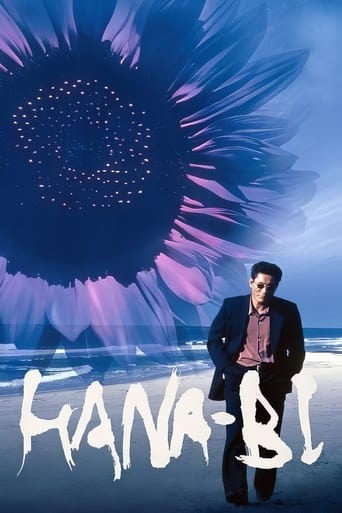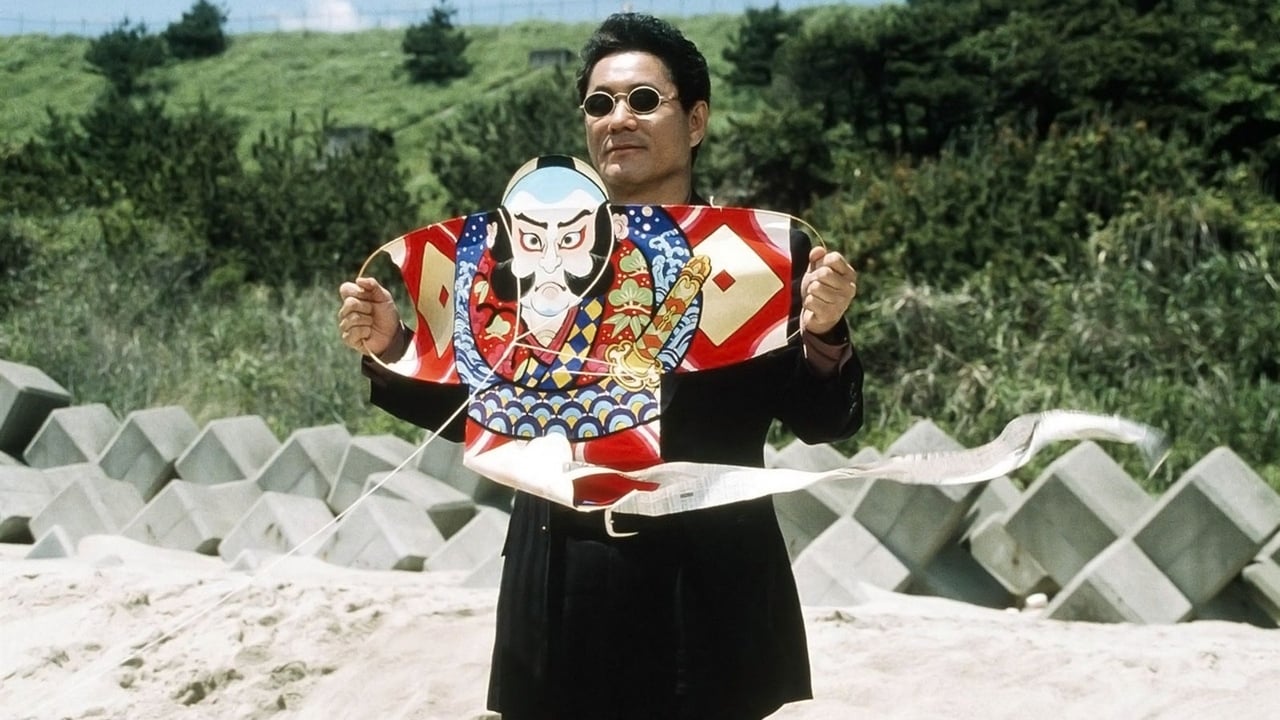louisson
I saw this on a big screen in 2016, when a "moving picture" means the camera moves. Most of the time the camera sat still and the cast acted in front of it as if on a stage. Boring!Second, the director is the lead actor. "Actor" in quotes: you see everything he has to offer in the first 10 seconds.Third, the paintings are by the director. At times it's as if we're being shown a gallery of his paintings, which, as the actor in the film who "creates" them says, "Colorful, but amateur." Amateur indeed.Fourth, the pacing of the film at times felt like watching paint try--and in some scenes that about what we did--watch the paint dry.Fifth, the music becomes insipid, like something from "Peyton Place" with Lana Turner. Lastly, I don't think this is a spoiler; it's a comment on the lead character, not the plot. The lead character is a violent thug; that's who he is; and, when he has to encounter his own crises, he's an empty and helpless as he is toward others. As a result, I had absolutely no sympathy toward him; I felt detached. I was tempted to walk out after 30 minutes, and again after 60. The night fresh air would be have far more worthwhile.
Spikeopath
Hana-bi (AKA: Fireworks) is written and directed by Takeshi Kitano. It stars Kitano, Kayoko Kishimoto, Ren Osugi and Susumu Terajima. Music is by Joe Hisaishi and cinematography by Hideo Yamamoto.Yoshikata Nishi (Kitano) is a loose cannon police detective who quits the force after a tragic incident results in his partner, Horibe (Osugi), being confined to a wheelchair. His retirement brings him the time to care more for his seriously ill wife Miyuki (Kishimoto). Nishi can find no peace, though, more so as he has borrowed money from the Yakuza to pay for his wife's needs, and they are growing impatient for the repayment...Very early in Kitano's superb slice of Japanese neo-noir there is a piece of graffiti on the wall, it says "Drop Dead", while Hisaishi's music is a devilish accompaniment to the scene. It's ominous and foreboding, setting the tone for what is to follow. Pic is deliberately paced, beautifully so, with the opening nonlinear approach and scattergun shifts in time adding a sort of psychological maelstrom to the impending narrative darkness.Yet to suggest it as a perpetually bleak picture is doing it a small disservice, for Kitano (himself working from a damaged psyche that occurred in real life) has this adroit eye for poetic beauty and human tenderness that marries up with bursts of violence and emotionally shattering passages of play. And it works brilliantly, with stabs of humour also filtering in via the outer frames. Nishi the character is a force of nature and a walking - brooding - contradiction, a man pained behind his sunglasses, his expressionless visage amazingly still saying so much. When he explodes the impact is doubly strong, mainly because dialogue is so sparse, but the interwoven visuals - very much a Kitano speciality - strike an almighty chord for the story. To which we edge towards the finale, which unsurprisingly brings beauty and infinite sadness.Unfussy camera work, sabre sharp editing (Kitano & Yoshinori Oota), elegiacal musical arrangements, art, kites and Kitano's intense performance, this rounds out as film making greatness. In fact, a masterpiece. 10/10
TheFilmGuy1
This is certainly a Kitano film, through and through. Art, long takes, close ups, silent characters, sudden violence, and wacky humour. It's all here. I have seen many say that Hana-bi is Kitanos best film, but I would probably disagree and say Sonatine is. I feel that the films are quite similar, but Sonatine just does it better. That's not to say that Hana-bi isn't a great movie. Kitano plays a very similar character to his other films. A silent and violent cop who retires from the force due to a certain incident and the fact that his wife is sick. He plays the character well and you certainly feel the pain he is experiencing. What I found slightly strange about the film was the side plot of the partner who was injured and starts to paint to keep himself busy. We keep cutting back to this story, and I couldn't quite place the significance. Looking at it from a very basic point of view, it does nothing to help the plot. Obviously it has a deeper meaning to it, but I can't quite understand it myself. I think I would need to analyse the film more. I almost feel like it may be some kind of personal statement by Kitano. He was involved in a car crash in real life and began to paint after it. Perhaps parts of this film, if not all, is about Kitanos accident and the feelings he had after having a near death experience. That would explain a lot. I feel overall, Sonatine does a better job of doing what Hana-bi tries to do. Sonatine has similar themes, but displays those theme more clearly and concisely, while Hana-bi is much more up to your own interpretation at times. Also, the humour in Sonatine works perfectly, while it feels out of place many times in Hana-bi. That's not to say the humour isn't funny. I actually found it extremely funny (especially a scene involving a camera on a timer), but it just felt quite out of place at times. In the end, Hana-bi feels like a lesser version of Sonatine. Even though Hana-bi came after, I just found myself thinking "Sonatine did it better". I got goosebumps from Sonatine, but not Hana-bi. But I think it might be a matter of opinion, and I think this is a great film that should be seen.
ackstasis
Takeshi Kitano's 'Hana-Bi' is something of an oddity. True to his previous efforts as director, the film contains its fair share of shockingly-graphic violence, and yet at its heart lies a touching tale of love, loyalty and devotion. For the entire running time, Kitano (who, aside from directing, also wrote and starred in the film) treads a perilously fine line between the two thematic extremes; it is an intricate balancing act that, if attempted by a less-talented filmmaker, might very possibly have turned into a complete cinematic disaster. Nevertheless, the director manages to pinpoint this perfect centre of balance, and the clash of beauty and violence combines to create a jarring amalgamation of conflicting emotional responses. We, as the audience, as simultaneously repulsed and entranced; as a whole, 'Hana-bi' is one of the most beautiful film experiences of the last decade or so.The title of the film itself acknowledges these opposing visual styles. Whilst the Japanese word 'Hanabi' translates to 'Fireworks' (the title under which it was released in the United States), the addition of the hyphen to the title ('Hana-bi') emphasises two individual components of the word, which translate respectively into "Fire" and "Flower," the collision of destruction and beauty/renewal. Much of the film concerns a cop named Yoshitaka Nishi (Kitano), who is forced to retire after a shooting on the job leaves his partner, Horibe (Ren Osugi), paralysed, alone and confined to a wheelchair. All the while, Nishi is still coming to terms with the impending loss of his wife, Miyuki (Kayoko Kishimoto), who is slowly dying from leukemia. As any grieving husband might do in such a situation, Nishi decides to quietly rob a bank, and he then uses most of the proceeds to fund a final loving family holiday for his ailing partner.The scenes between Nishi and his wife are among the most touching I've ever witnessed. Miyuki has only two lines in the entire film, and so the couple spend most of their time in complete silence and quiet reflection, and yet you can truly sense the affection that they both have for each other. Their love is completely unspoken, and this makes it all the more touching when Miyuki does finally speak. Another touching character is Horibe, the loyal police force partner whose crippling injury leaves him alone and depressed. After attempting suicide, Horibe receives painting materials in the mail, and he commits his emotions to canvas, finally uncovering a reason for his continued existence (importantly, the artwork we see in the film was actually created by Kitano in 1994, after a near-fatal motorcycle accident). The film's phenomenally moving soundtrack was composed by renowned Japanese composer Joe Hisaishi, in his fourth collaboration with the director.There are very few negative criticisms that can be said of 'Hana-bi.' One possible item is that the film's unusual flashback structure made some plot-points difficult to follow, and I'm still unsure of which cop's lonesome widow Nishi was in the habit of visiting. However, that's the only critique that springs straight to mind. All in all, 'Hana-bi' is a gloriously assorted blend of violence, love and gentle humour, and a first viewing is not likely to be forgotten in a hurry.


 AD
AD




